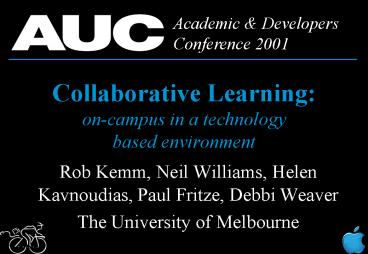Collaborative Learning: oncampus in a technology based environment - PowerPoint PPT Presentation
1 / 25
Title:
Collaborative Learning: oncampus in a technology based environment
Description:
Rob Kemm, Neil Williams, Helen Kavnoudias, Paul Fritze, Debbi Weaver ... Informality. Discussion. Note-taking. Economical. Collaborative Learning. Aided by Computer ... – PowerPoint PPT presentation
Number of Views:43
Avg rating:3.0/5.0
Title: Collaborative Learning: oncampus in a technology based environment
1
Collaborative Learningon-campus in a technology
based environment
Academic Developers Conference 2001
- Rob Kemm, Neil Williams, Helen Kavnoudias, Paul
Fritze, Debbi Weaver - The University of Melbourne
2
Outline of Talk
- Collaborative Learning on Campus
- Complements Anytime, Anywhere
- but not just now
- Important for Professional Development
- Generic skills etc.
- Course Structure
- Evaluate or Perish
- Multiple approaches
- Modules and Courses
3
Collaborative Learning Environment
- 3 / group
- Combining
- Text Books
- Informality
- Discussion
- Note-taking
- Economical
4
Collaborative Learning
- Aided by Computer
- Access to resources economically on WWW
- Challenging problems
- Interactive models and model building
- Facilitated by humans
- Tutors for unforseen help group processes
- Student interplay (peer-learning -teaching)
- On-campus
5
Semester in 2nd Year Science
6
Science-CAL weekly structure
- Preparatory open-ended questions
- Task-Sheets paper-based
- Problem Task Sheets on Web-delivered and/or
Stand-alone module on iMac - Progress self-assessment with open-ended
Extension Questions - Individual Revision with Learning MCQs (4 of 5
correct) - (Group Project - writing peer processes)
7
Evaluation
- Formative Summative
- for all Collaborative Sessions
- for Individual Modules
- Iterative cycles
- Development Evaluation
- Implementation Evaluation
8
Evaluation Approaches
- Modifications advised by
- Graduate-student pre-trials
- Student Questionnaires
- Observations Focus groups
- Computer Audit Trails
- Tutor Feedback
- Analyses of Learning Outcomes
9
Analyses of Learning Outcomes
- Transfer skills
- Pre- Post-Tests
- Analysis of Specific Exam Answers
- Exam correlations for Cohorts
- with collaborative learning
- With approaches to learning
10
Web-based Problems (majority of course)
- Interactive re-useable components
11
OCCA-based Problems (AUC 2000)
- Record all Student Activities for recall
12
Stand-alone Module (a few in course)
- Subject to Intensive Evaluation
13
Model Blood Pressure Control
- Complete connection of neurones
14
Audit Trail Analysis
- Control of BP Control Version 1.0
15
Model Kidney Cell Function
- Partially completed task
16
Analysis of pre- post-tests
- Transfer of Skills not good
- Learning styles important
- Trial error, thinking out, guessing etc.
- Principles involved only implied
- Revision of principles
- Introduce module on principles
- Encourage thinking out solutions
17
CL Influence on 2nd Year Exams
- Groups from 1st Year Performance
18
Defining New Cohorts for Analysis
- Performance Changes
- 1st Year to 2nd Year
- Improvers gt 8 (1SD)
- Disappointers lt -8
- Remainder
19
Multi-Choice vs Collab. Learning
- No clear distinction
20
Exam Writing vs Collab. Learning
- Improvers perform much better
21
Multi-Choice vs. Group Project
- No clear distinction
22
Exam Writing vs Group Project
- Improvers perform better, threshold?
23
Conclusion
- Our Collaborative Learning Environment
- Leads to better learning outcomes
- High and middle achievers in exams
- Group Project Skills
- Used effectively by improvers
24
QA
25
Predictions













![Maharishi University of Management and Technology - [MUMT], Bilaspur PowerPoint PPT Presentation](https://s3.amazonaws.com/images.powershow.com/9657642.th0.jpg?_=20210907048)

















